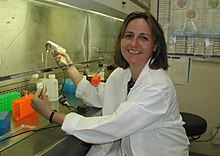Crystal Mackall
Crystal Mackall | |
|---|---|
 Mackall at the National Cancer Institute in 2002 | |
| Born | Crystal L. Mackall |
| Alma mater | University of Akron Northeast Ohio Medical University |
| Awards | National Institutes of Health Director's Award National Cancer Institute Director's Award |
| Scientific career | |
| Fields | Immunotherapy Chimeric antigen receptors Pediatric oncology T cell homeostasis[1] |
| Institutions | Stanford University National Cancer Institute National Institutes of Health |
| Website | profiles |
Crystal L. Mackall (born August 21, 1960) is an American physician and immunologist. She is currently the Ernest and Amelia Gallo Family Professor of Pediatrics and Medicine at Stanford University.[1][2] She is the founding director of the Stanford Center for Cancer Cell Therapy.
Education and early career[]
Mackall grew up in East Palestine, Ohio in a working class family; her father was a steelworker. She received her medical training through a six year BS/MD program, earning her bachelor's degree at the University of Akron and graduated summa cum laude.[3] She completed her medical education at Northeast Ohio Medical University, earning her Doctor of Medicine in 1984. She was a member of the Alpha Omega Alpha honour society. Mackall completed an internal medicine and pediatrics Residency at Cleveland Clinic Akron General and Children’s Hospital of Akron in 1988.[3] In 1989, Mackall joined the National Cancer Institute as a fellow in pediatric oncology, where she began to focus on immunotherapy for cancer.[4][5] She remained at National Institutes of Health until 2016, eventually serving as the Chief of the Pediatric Oncology Branch.[6] She moved to the Stanford University School of Medicine in 2016.[7] She is Board Certified in Internal Medicine, Pediatrics, and Pediatric Hematology/Oncology.[8][9]
Research[]
Mackall has pioneered cancer immunotherapies for children. Her early research defined the effects of traditional cancer therapies on the immune system, where she identified the role of the thymus in human T cell regeneration and discovered that Interleukin-7 (IL-7) is the main regulator of T cell homeostasis in humans.[9][10] Her group was among the first to demonstrate impressive activity of CD19 chimeric antigen receptor (CAR T cells) therapies for childhood leukemia and also developed a CAR targeting CD22 that was active in this disease.[11]
Mackall has also worked on cancer vaccines, immunomodulation therapy and bone marrow transplants. She received the Lila and Murray Gruber Award for Cancer Research in 2019, in 2018 Mackall was awarded $11.9 million to lead a clinical trial using genetically modified immune cells that will recognise proteins in leukemia.[12] The trial will be conducted at the Stanford Center for Cancer Cell Therapy. She will modify the chimeric antigen receptor T cell (CAR-T) to identify B-cell prolymphocytic leukemia and B-cell lymphoma.[12]
Mackall holds a number of patents relating to peptides and antigen receptors. She has served on the editorial boards of several cancer journals, including Cancer Today.
Awards and honors[]
- 2000 National Institutes of Health Distinguished Clinical Teacher Award
- 2003, 2010 National Cancer Institute Director's Award
- 2005 American Society for Clinical Investigation Member
- 2006-2018 Best Doctors in America Member
- 2012 National Institutes of Health Great Teacher Lectureship
- 2013 Children's Hospital of Philadelphia Alexandra Scott Lectureship in Pediatric Oncology
- 2013 National Institutes of Health Director's Award
- 2015 National Institutes of Health G. Burroughs Mider Lectureship
- 2017 MD Anderson Cancer Center Warren Sutow Distinguished Lectureship
- 2018 Top 10 Clinical Research Award for New CAR-T Cell Therapy for Relapsed Leukemia[13]
- 2019 American Academy of Dermatology Lila and Murray Gruber Memorial Cancer Research Award[14]
Personal life[]
She identifies as LGBT and is married to Catherine L. Salem MD. The two have two sons, Theo Salem-Mackall and Zachary Salem-Mackall. [15]
References[]
- ^ Jump up to: a b Crystal Mackall publications indexed by Google Scholar

- ^ Lee, Daniel W; Kochenderfer, James N; Stetler-Stevenson, Maryalice; Cui, Yongzhi K; Delbrook, Cindy; Feldman, Steven A; Fry, Terry J; Orentas, Rimas; Sabatino, Marianna; Shah, Nirali N; Steinberg, Seth M; Stroncek, Dave; Tschernia, Nick; Yuan, Constance; Zhang, Hua; Zhang, Ling; Rosenberg, Steven A; Wayne, Alan S; Mackall, Crystal L (2015). "T cells expressing CD19 chimeric antigen receptors for acute lymphoblastic leukaemia in children and young adults: a phase 1 dose-escalation trial". The Lancet. 385 (9967): 517–528. doi:10.1016/S0140-6736(14)61403-3. ISSN 0140-6736. PMC 7065359. PMID 25319501.

- ^ Jump up to: a b "Crystal L. Mackall, MD". aacr.org. Retrieved 2019-06-17.
- ^ "Crystal L. Mackall, MD". aacr.org. Retrieved 2019-06-17.[verification needed]
- ^ "Crystal Mackall". stanfordhealthcare.org. Retrieved 2019-06-17.[verification needed]
- ^ "Crystal Mackall, MD". parkerici.org. Parker Institute for Cancer Immunotherapy. Retrieved 2019-06-17.[verification needed]
- ^ "Crystal Mackall, MD". parkerici.org. Parker Institute for Cancer Immunotherapy. Retrieved 2019-06-17.[verification needed]
- ^ "Crystal Mackall". stanfordhealthcare.org. Retrieved 2019-06-17.
- ^ Jump up to: a b "Crystal Mackall, MD". parkerici.org. Parker Institute for Cancer Immunotherapy. Retrieved 2019-06-17.
- ^ "Immunotherapy Expert Crystal Mackall, MD, Joins Stanford Medicine Faculty - The ASCO Post". ascopost.com. Retrieved 2019-06-17.
- ^ Fry, Terry J; Shah, Nirali N; Orentas, Rimas J; Stetler-Stevenson, Maryalice; Yuan, Constance M; Ramakrishna, Sneha; Wolters, Pamela; Martin, Staci; Delbrook, Cindy (2018). "CD22-targeted CAR T cells induce remission in B-ALL that is naive or resistant to CD19-targeted CAR immunotherapy". Nature Medicine. 24 (1): 20–28. doi:10.1038/nm.4441. ISSN 1078-8956. PMC 5774642. PMID 29155426.
- ^ Jump up to: a b "Mackall awarded $11.9 million for anti-leukemia clinical trial". med.stanford.edu. Retrieved 2019-06-17.
- ^ "Crystal Mackall's Profile | Stanford Profiles". profiles.stanford.edu. Retrieved 2020-10-18.
- ^ "Lila and Murray Gruber Memorial Cancer Research Award and Lectureship". www.aad.org. Retrieved 2020-10-18.
- ^ "+OUTlist". Stanford Medicine. Retrieved 2020-10-18.
- American women physicians
- Cancer researchers
- Stanford University faculty
- University of Akron alumni
- 1960 births
- Living people
- LGBT scientists from the United States
- American women scientists